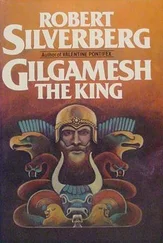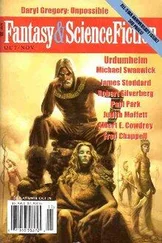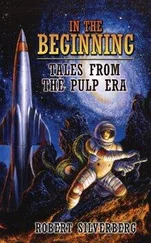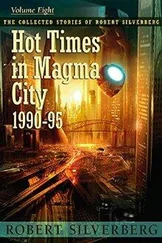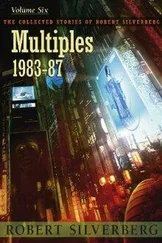So these capering animals were more likely the Irtiman’s kin than ours, the pitiful hideous descendants, I supposed, of those Irtimen who had come to the Summit to found a village long ago. Yes, I thought: they must surely be Irtimen of some sort. But that did not make them gods. Wild decadent Irtimen, that was all they were, who had slipped into barbarism during the thousands of years of their settlement here.
I said as much to Traiben.
“And where are the gods, then?” he asked me, in a hard sharp-edged tone that seemed not like his voice at all. “Where, Poilar? Where are they? We are at the Summit—is there any doubt of that? But I don’t see the shining palaces. I don’t see the golden courtyards. I don’t see the feasting-hall of Kreshe. The First Climber said, He found gods here when He finally reached this place. Well, where are they?” He waved his hand once again toward the rockbound lairs of the savage Irtimen. “Where are they, Poilar?”
To Traiben’s questions I had no answers. His words struck at me like hammers, and I stood there and accepted the blows, but my heart cried out from the pain and there was a moment when I thought I would rather hurl myself from the mountain than have to listen to any more of what he was saying. For something perverse within me said to me that Traiben was right, as he so often was, that there were no gods atop this mountain or else that these creatures were our gods, or the children of our gods, and some terrible mistake had been made and perpetuated across the thousands of years of the Pilgrimage.
I could not face the possibility that that was so. Not only was it blasphemy: it was an absurdity besides, the negation of everything I believed. To have come this far, and suffered so much, for nothing? It could not be. The mere thought of it sent a black wind roaring through my soul.
But I could not refute Traiben’s arguments, either. For where were the palaces I had dreamed of beholding up here? Where, indeed, were the gods? We could see virtually from one side of the Summit to the other. And all that we had found here were two metal houses—one house small and gleaming with a few frightened faces peering out from it, faces that did not seem to be the faces of gods, and the other one large and old and rotting—and a band of strange naked creatures capering and shrieking and hurling missiles with wild uncertain aim.
It was an awful moment. Everyone was looking at me, waiting for me to tell them what to do. They had not heard what Traiben had said, nor did any of them know a thing of what the dead Irtiman had told me in his final hours about the Summit and the gods. But here we were at the Summit, and what was to happen now? What could I say, how could I explain? This was the culmination of our Pilgrimage. Was this all there was, these two metal houses, these strange shrieking creatures? Were we now supposed to turn around and slink back down through all the myriad Kingdoms to the half-forgotten village at the bottom of the Wall that we had set out from so long ago, and take up life in the roundhouse of the Returned Ones, and maintain a silence about all that we had seen at the Summit, as those who had returned before us had done?
The taste of ashes was in my mouth. I had never known such despair. I could not hide, I could not flee, I could not offer any explanations. But perhaps this shining metal house held the answers I wanted, or some part of them.
On legs that felt like slabs of wood I stumbled forward, with no plan in my mind, until I found myself standing beneath the little gleaming house on metal struts. The faces still were peering from the small windows.
This close, I recognized them plainly for what they were. Not the faces of gods, whatever the faces of gods might be like—no, almost certainly not gods.
They were the faces of Irtimen. The three friends of our Irtiman, to whom he had been so eager to return before he died.
Well, I had promised to bring him to them. And I had.
“Irtimen!” I cupped my hands to my mouth and shouted with all my strength. It seemed to me that the wind was blowing away my words; I could scarcely hear my voice myself. But I persevered. “Irtimen! Irtimen! Listen to me! I am Poilar Crookleg of Jespodar village, and I have something for you!”
Silence. A terrible stillness on the plateau.
“Irtimen, do you hear me? Use those little boxes of yours that let you speak our language!”
But how could they hear me, locked up inside that metal house of theirs?
I turned and looked back. Kilarion and Talbol had carried the preserved body of the Irtiman the last leg of the journey to the Summit. Now it lay like a child’s discarded doll at the edge of the plateau, where we had come up into this place.
I gestured to Kilarion. “Bring it here!” I called.
He nodded and scooped the Irtiman’s body up, perching it across his shoulder so that it dangled downward, and carried it toward me. I told him what to do and he set it down on the ground facing the little metal house of the Irtimen, propping its back against a rock in such a way that it was looking up at them.
“Irtimen!” I cried. “There is your friend! I found him wandering far down below, and we brought him with us for you, and we cared for him until he died! And kept him with us even after that! There he is! We have brought you your friend!”
I waited. What else could I do, but wait?
The faces disappeared from the windows of the metal house. But nothing else happened. It was a moment that seemed to stretch forever. I heard my people murmuring behind me. Perhaps they thought I had gone out of my mind. I was beginning to wonder myself whether I had.
But I waited. I waited.
Then a kind of door began sliding open on the metal house. A hatch, rather, in its side. A ladder appeared. It occurred to me that this must not really be a house, but rather the ship in which the Irtimen had traveled between the worlds. And the other house, the ancient ruined one, must be the one in which the settlers had come from Earth to our world thousands of years ago.
I saw a foot on the topmost rung of the ladder. An Irtiman was coming down.
He was very slender, with long flowing hair that looked like gold, and he carried a speaking-box under his arm like the one that our Irtiman had carried. Or under her arm, I should say, for this Irtiman wore only a light simple garment despite the biting cold, and I saw what surely were the swellings of two breasts beneath it. So this Irtiman was a she, in the sexual form. Had I interrupted a mating? No, no, more probably she wore that form all the time. How strange that seemed to me, that these people’s bodies should always be ready for mating like that! More than anything else it said to me that these Irtimen, who resembled us outwardly in so many trifling ways, were indeed alien creatures, creatures of some other creation.
The female Irtiman stepped forward until she was no more than a dozen paces from me. She glanced at the dead Irtiman on the ground, and although I had no real way of comprehending the meaning of an Irtiman’s facial expressions it seemed clear to me that the look on her face was one of displeasure, distaste, even disgust I think I saw some fear there also.
She said, “Did you kill him?”
Her voice, coming to me out of the language-box, was lighter than the other Irtiman’s had been, a high clear tone.
“No,” I said indignantly. “We are not murderers. I told you we found him wandering on the mountainside, and we cared for him. But he was very weary and before long he died. And I decided to bring him to you, because he seemed so badly to want to return to you, and I thought you would want to have him back.”
“You knew that we were here?”
Читать дальше

